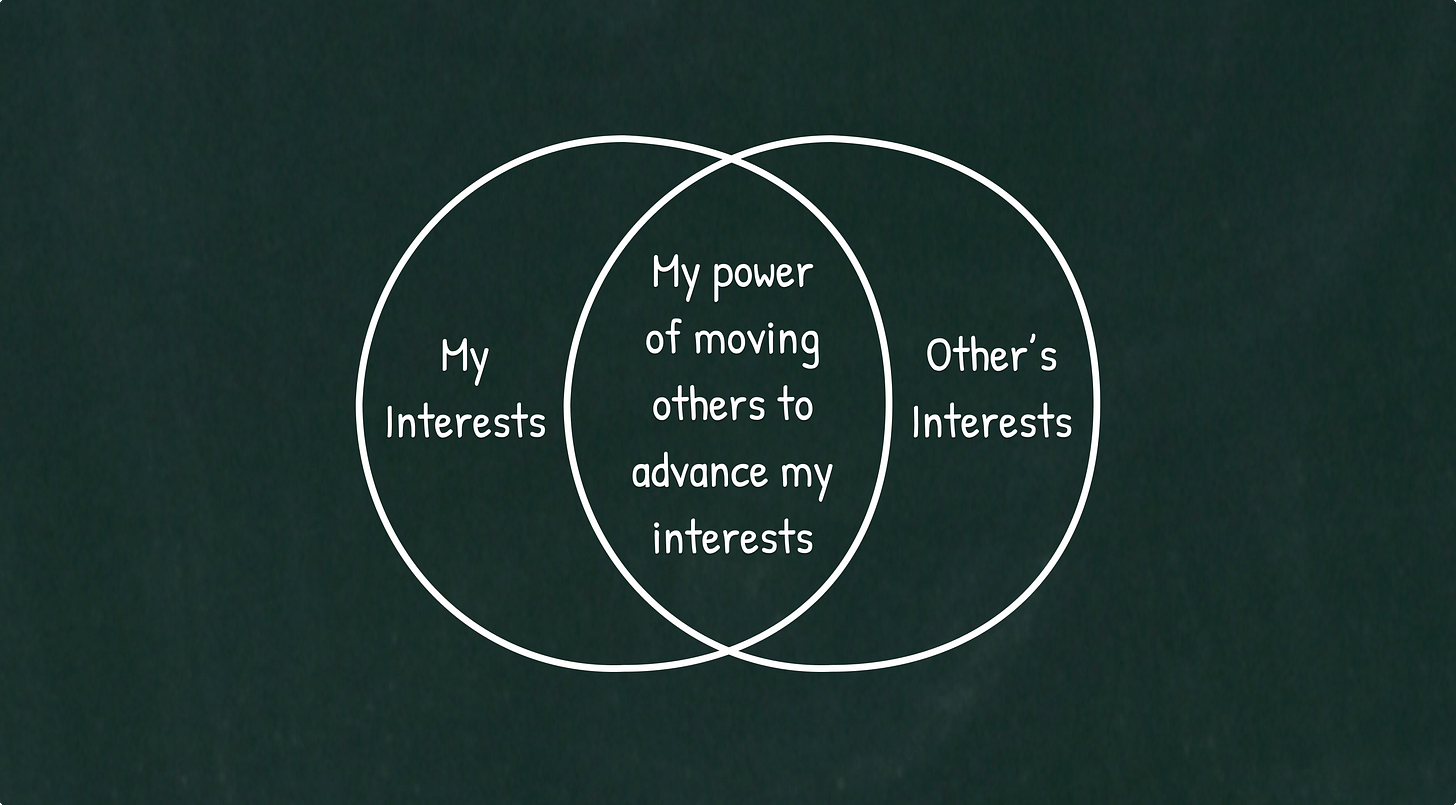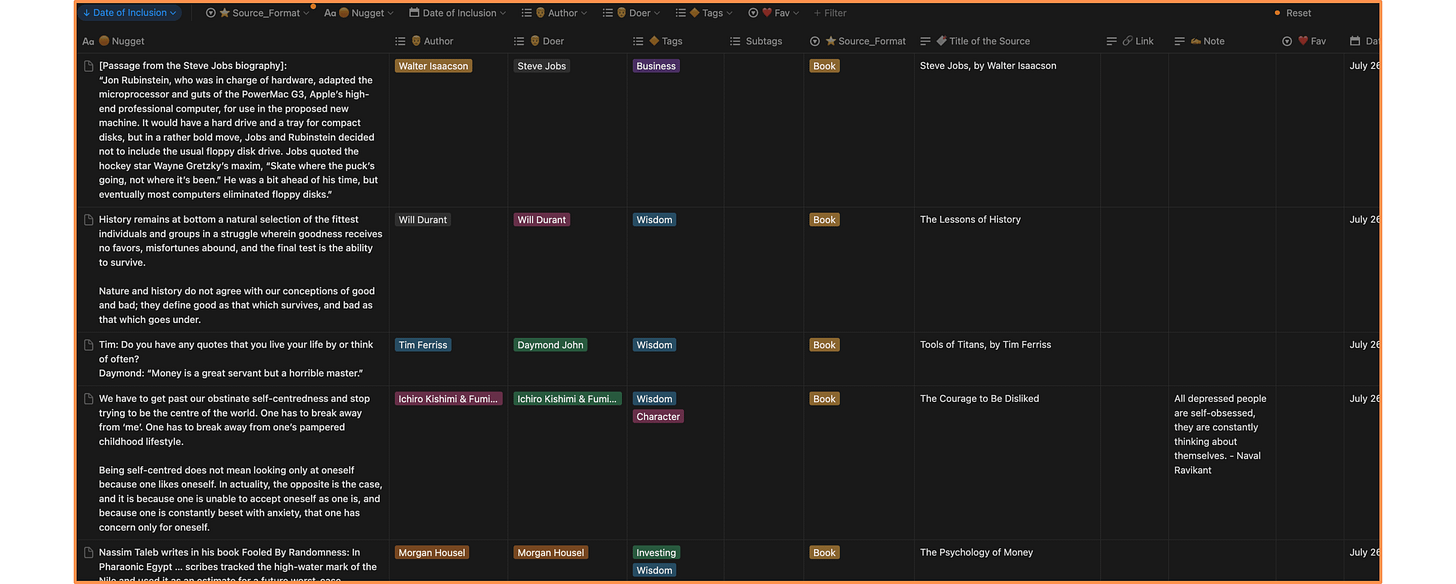The Superpower of Incentives: How to Get People to Do What You Want
Nugget by Robert Greene & Charlie Munger
👋 Hey friend,
Today’s insight is on the power of incentives: how to make people’s self-serving bias—their pursuit of self-interest—work for us.
The first passage comes from Robert Greene’s The 48 Laws of Power (by the way, I recently published an article with all my highlights & notes from The 48 Laws of Power—you can read it here).
The last passage comes from Charlie Munger’s speech The 25 Tendencies of Human Misjudgment (later transcribed in the book Poor Charlie’s Almanack).
Never a year passes but I get some surprise that pushes a little further my appreciation of incentive superpower.
- Charlie Munger
👤 Doers
💡Nugget
🟠 Robert Greene:
⚜️ Law 13 - When Asking for Help, Appeal to People’s Self-Interest, Never to Their Mercy or Gratitude.
In your quest for power, you will constantly find yourself in the position of asking for help from those more powerful than you. There is an art to asking for help, an art that depends on your ability to understand the person you are dealing with, and to not confuse your needs with theirs.
Most people never succeed at this, because they are completely trapped in their own wants and desires. They start from the assumption that the people they are appealing to have a selfless interest in helping them. They talk as if their needs mattered to these people—who probably couldn’t care less. Sometimes they refer to larger issues: a great cause, or grand emotions such as love and gratitude. They go for the big picture when simple, everyday realities would have much more appeal. What they do not realize is that even the most powerful person is locked inside needs of his own, and that if you make no appeal to his self-interest, he merely sees you as desperate or, at best, a waste of time.
…
“The shortest and best way to make your fortune is to let people see clearly that it is in their interests to promote yours.” - Jean de La Bruyère, 1645–1696.
"There are two motives to action: self-interest and fear."
- Napoleon Bonaparte.
Charlie Munger has talked extensively about the power of incentives and the importance of appealing to other people’s self-interest. He opened his famous speech The 25 Tendencies of Human Misjudgment (later transcribed in the book Poor Charlie’s Almanack) with the self-interest human tendency, and he shared many insightful examples:🟠 Charlie Munger:
I place this tendency first in my discussion because almost everyone thinks he fully recognizes how important incentives and disincentives are in changing cognition and behavior. But this is not often so. For instance, I think I’ve been in the top 5 percent of my age cohort almost all my adult life in understanding the power of incentives, yet I’ve always underestimated that power. Never a year passes but I get some surprise that pushes a little further my appreciation of incentive superpower.
One of my favorite cases about the power of incentives is the Federal Express case. The integrity of the Federal Express system requires that all packages be shifted rapidly among airplanes in one central airport each night. The system has no integrity for the customers if the night work shift can’t accomplish its assignment fast. And Federal Express had one hell of a time getting the night shift to do the right thing. They tried moral suasion. They tried everything in the world without luck. And finally, somebody got the happy thought that it was foolish to pay the night shift by the hour when what the employer wanted was not maximized billable hours of employee service but fault-free, rapid performance of a particular task. Maybe, this person thought, if they paid the employees per shift and let all night shift employees go home when all the planes were loaded, the system would work better. And, lo and behold, that solution worked.
Early in the history of Xerox, Joe Wilson, who was then in the government, had a similar experience. He had to go back to Xerox because he couldn’t understand why its new machine was selling so poorly in relation to its older and inferior machine. When he got back to Xerox, he found out that the commission arrangement with the salesmen gave a large and perverse incentive to push the inferior machine on customers, who deserved a better result.
Then there is the case of Mark Twain’s cat that, after a bad experience with a hot stove, never again sat on a hot stove, or a cold stove either.
We should also heed the general lesson implicit in the injunction of Ben Franklin in Poor Richard’s Almanack: “If you would persuade, appeal to interest and not to reason.”
This maxim is a wise guide to a great and simple precaution in life: Never, ever, think about something else when you should be thinking about the power of incentives. I once saw a very smart house counsel for a major investment bank lose his job, with no moral fault, because he ignored the lesson in this maxim of Franklin. This counsel failed to persuade his client because he told him his moral duty, as correctly conceived by the counsel, without also telling the client in vivid terms that he was very likely to be clobbered to smithereens if he didn’t behave as his counsel recommended. As a result, both client and counsel lost their careers.
We should also remember how a foolish and willful ignorance of the superpower of rewards caused Soviet communists to get their final result, as described by one employee: “They pretend to pay us, and we pretend to work.” Perhaps the most important rule in management is “Get the incentives right.”
All the nuggets I’ve picked for the past 5 years are saved and classified in a searchable database, which (as of August 2025) contains 4,595 timeless ideas (sourced directly from the most influential doers and entrepreneurs — captured on books, interviews/podcasts, tweets, and articles).
I call this database Doers Notebook.
🤔 Why did I build this?
Well, as the Latin motto goes, “A chief part of learning is simply knowing where you can find a thing.” And since it’s all 🔎 searchable, we only need to type a keyword to immediately get a list of insights related to it!
For instance, if I’m unsure about how to get more sales in my business, I can simply type the word “sales” and immediately get 126 insights relevant to sales! In this case from Jim Edwards, Peter Thiel, Naval Ravikant, Paul Graham, Sam Altman, Balaji Srinivasan, Nassim Taleb, and many other remarkable individuals.
It’s like having a second brain 🧠 from which we can pull wisdom on demand, to help us significantly decrease the error rate in our judgment and also get new perspectives on how to solve problems.
In an age of infinite leverage [code and media], judgment is the most important skill.
- Naval Ravikant
A change of perspective is worth 80 IQ points.
- Alan Kay
If you want to see Doers Notebook in action, I made a screen record!
You can also go directly to DoersNotebook.co
💥 Stuff I Loved
Greetings from Chiang Mai, Thailand 🇹🇭
Talk you soon,
Your nuggets friend Julio :)













